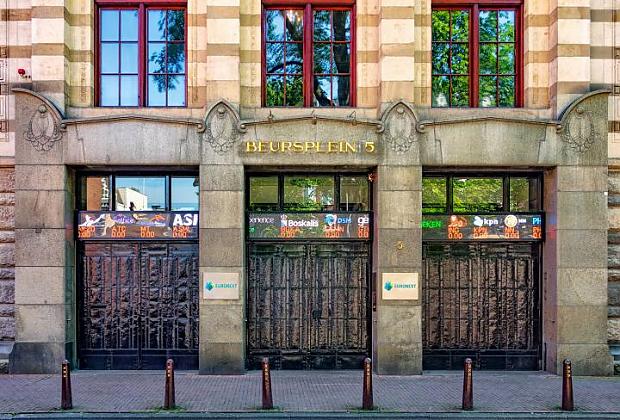For Big Capital, everything is up for grabs
For Big Capital, everything is up for grabs

The memoranda regarding the abolition of the Netherlands' tax on dividends reveal the government at its worst. In the wake of the clumsy drivel about who knew what and when and who knew about which memoranda and who could or could not remember them, the Dutch people are left with a bewildering textbook example of a shareholders' economy and fraud hidden from sight.
- By Rob Janssen
During the parliamentary debate on the scandal at the end of last month, SP leader Lilian Marijnissen compared what had occurred to the board game Cluedo, in which the players take on the role of detectives trying to solve a murder mystery by saying not just 'whodunnit', but the weapon used and the place where the killing took place. “Who?” she asked. “The Prime Minister. With what weapon? The memos. Where? In the boardrooms of Unilever and Shell.” Marijnissen moved quickly on to ask the really big question: “Why has the Prime Minister subordinated his credibility to the interests of big capital?”
The debate concerned the now notorious memoranda, drafted during the formation of the present coalition government, yet discussing a policy – the abolition of the tax on shareholders' dividends – which was not included in any of the four coalition parties' manifestos. The estimated cost of the abolition is €1.4 billion per annum. Prime Minister Mark Rutte's credibility was undermined, but the question is, why did he not move to repair it? Or, in other words, what exactly was involved in the scrapping of this dividend tax?
Deducted from the profits from shares, in fiscal terms the tax on dividends is what's known as a 'withholding tax'. Firms which have their principal establishments in the Netherlands withhold the dividend tax when they distribute dividends to their shareholders. A shareholder who pays his or her tax elsewhere can subtract this Dutch tax when paying tax on the profits at home. So, for instance, an American who is in the US system rather than the Dutch, will currently pay the Dutch rate of 15% in the Netherlands. In the US, however, the equivalent rate is 30%. Due to international taxation treaties designed to prevent people from having to pay tax twice over, the American will pay 15% in the Netherlands, and the remaining 15% in the US. If the Netherlands abolishes its dividend tax, the US Inland Revenue will charge the full 30%. The shareholder will be unaffected, the US will gain, and the Netherlands will lose substantial income.
But there's still more. There are countries in which no tax whatsoever is imposed on earnings from shares. These include not only some of the well-known tax havens such as the Cayman Islands, but also the United Kingdom. For people registered for tax in these countries, the abolition of the dividend tax is a pure gift from the Netherlands. As things stand the British investor pays the 15% rate on the income from Dutch shares, and nothing on income from shares in UK corporations. Should the Dutch rate be reduced to nil also, the Netherlands will become more attractive to the UK-based investor. According to analysts, such aspects should also be looked at against the background of Brexit and the possible considerations of British firms when they weigh up investing in the Netherlands.
Currently the Netherlands' treasury benefits from the dividend tax to the tune of €1.4 billion p.a. Prime Minister Mark Rutte argues that this will be outweighed by the degree to which the country will become more attractive to foreign firms. But is this really the case? The aforementioned notorious memoranda reveal that officials from the Finance Ministry informed the government that the scrapping of the dividend tax would have little influence on the country's investment climate, and that would put the Netherlands' 'image' at risk. To cap it all, Graeme Pitkethly, Chief Financial Officer for Unilever, last month told the national newspaper De Telegraaf that the possible abolition of the dividend tax had played 'no great role' in the firm's decision to keep its headquarters in Rotterdam., while the government repeatedly claimed that Unilever would move abroad should the tax be left intact.
You might in any case ask yourself whether there weren't better measures which could have been taken to promote employment and make the Netherlands more attractive to firms, measures which would cost a great deal less than €1.4 billion. According to Socialist Party leader Lilian Marijnissen, the government's plan would lead to higher taxes for the general public, a flood of foreign speculators and the confirmation of the Netherlands as an entrepôt for international financial constructions. “With €1.4 billion we could improve health care or reduce housing costs for tenants,” says Marijnissen. “In short, 90% - ordinary citizens in other words – pay up and the rich 10% pocket the proceeds.”
Not a single political party mentioned scrapping the dividend tax in its election manifesto. Yet despite this the government, and especially its biggest and most neoliberal component, the VVD, are determined to go for it. But why has it all been done so surreptitiously? Perhaps this is because of the question that is inextricably linked to this: what is going to be cut from the budget so that this €1.4 billion can be found?
Rob Janssen writes for the SP monthly Tribune, where this article first appeared, in the original Dutch.
